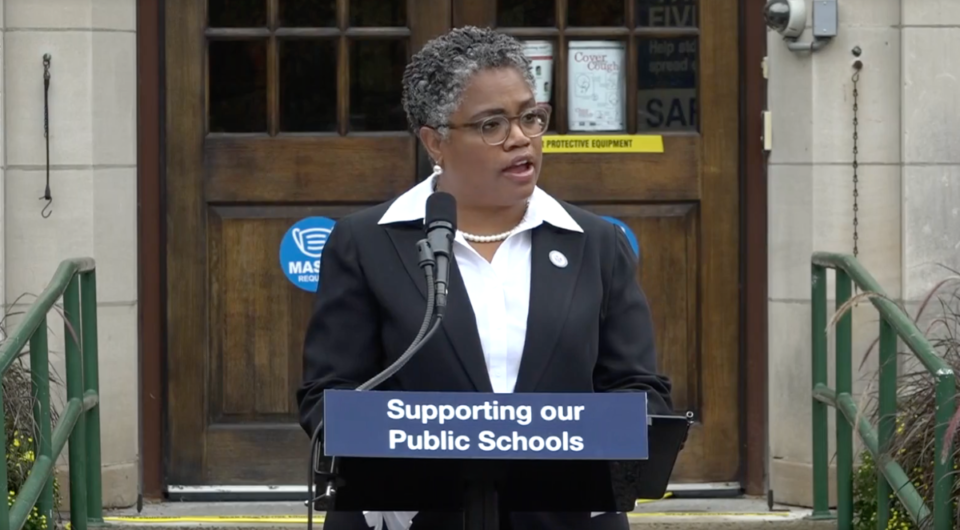New Newsworks Column: How Annual Standardized Testing Reveals Achievement Gaps
April 23, 2015Statistic of the Day
April 23, 2015N.J. Ed. Comm. Hespe: Districts with High Opt-Outs will Be Placed on Corrective Action Plans and Risk State and Federal Funding
Echoing U.S. Sec’y of Education Arne Duncan’s announcement this week at the Education Writers Association conference, N.J. Ed. Commissioner David Hespe said yesterday, according to the Star Ledger, that “New Jersey school that fails to have 95 percent of its students take the PARCC exams will be placed on a corrective action plan, and schools with especially high opt-out rates could have state funding withheld.”
Hespe said Wednesday that the first step is corrective action plans, which could require schools to hold more informational meetings about PARCC or to schedule face-to-face meetings with any parents who want to opt their children out of the tests.
Before levying any additional sanctions, the state would take into account whether this is the first year a district missed the 95 percent target, how much it missed it by and whether the school took actions either to prevent or promote opt outs, he said.
“Egregious situations” could result in the loss of federal or state funds, Hespe said
Almost all 3d-8th graders, or 96%, took PARCC tests last month, but 14.5% of high school juniors were opted out by their parents. The percentages of opt-outs were highest in N.J.’s wealthiest suburbs. For example, 70% of Montclair’s high school students sat out the tests and half of Princeton’s did.
Duncan and Hespe’s announcements directly contradict the advice offered by both NJEA and Save Our Schools-NJ, the two organizations that most enthusiastically push parents to refuse PARCC testing.
Save Our Schools told parents — incorrectly, it turns out — that “missing the 95 percent participation rate at the school level has not been unusual in New Jersey. And no federal financial penalties related to Title I instructional funds have been imposed on any New Jersey school for missing that participation rate.”
And this is posted as part of NJEA’s parent propaganda kit: “So will the US Department of Education take your school’s Title 1 funds if this legislation becomes law? The answer is NO, and here are some reasons why.” (That’s written, by the way, by Julie Sass Rubin, founder of SOS-NJ, which is based on Princeton.)
Another page of the media kit suggests that parents should “consider refusing to allow your child to take the PARRC or other standardized exams,” while another instructs parents that “corporate ed reform” supports “standardized testing” in order to expand “corporatized charter schools.” Another graphic insists that standardized tests directly lead to “putting CEO’s in charge of schools.”
You’d think that both associations, which proclaim their devotion to education, would show a little respect for facts.
Must students participate in the PARCC assessment?
Yes.
What is the impact on the school district if students do not participate in PARCC?
The level of student participation in PARCC can affect federal funding for K-12 education in New Jersey, state aid to school districts, state monitoring (NJQSAC) results, the new teacher evaluation process, and the school district’s ability to design curriculum to meet student academic needs.





1 Comment
Actually, Laura, the information that Chris Tienken and I provided and the information that Save Our Schools NJ gives to parents are all 100% accurate.
From Save Our Schools NJ:
5. If I refuse the PARCC tests for my child, will her/his school lose funding?
There is no federal or state law that requires penalties on schools if parents refuse to allow their children to take the PARCC tests. The federal No Child Left Behind (NCLB) law did include a mandate that required schools to have a 95 percent participation rate on state tests or face sanctions. However, missing the 95 percent participation rate at the school level has not been unusual in New Jersey. And no federal financial penalties related to Title I instructional funds have been imposed on any New Jersey school for missing that participation rate.
Since 2012, NJ has had a waiver to NCLB that replaces sanctions for missing the 95 percent participation rate with a new accountability system. Under the waiver, only schools designated “priority” or “focus” schools face direct intervention for missing state targets. Priority and focus schools can have up to 30% of their federal Title I funds re-directed by the NJDOE for specific “interventions,” but even these funds are supposed to be used for school improvement, not taken away. The overwhelming majority of the state’s 250 “priority” and “focus” schools are in high-poverty urban districts. See 2014 list here.
State law does give the Commissioner of Education broad authority over district budgets and funding, but this is not tied to participation rates on state tests. So far, there have been no reports of districts losing funding because parents opted their children out of state tests. Any effort to do so would face significant political and probable legal challenges, especially as more and more parents across New Jersey plan to refuse the PARCC tests for their children.
Source: http://www.saveourschoolsnj.org/parcc-faq/#5
The NJDOE and the USDOE are sabre rattling to try and intimidate parents, but we are not so easy to scare. Actually cutting funding to districts is very different from threatening to do so. The threats are long-standing. The reality is a lot more challenging to implement.
The day after Commissioner Hespe made his comments to the NJDOE, Senator Nia Gill sent him this letter:
https://www.facebook.com/SaveOurSchoolsNJ/posts/953225431377284
She and other Senators and Assembly members are introducing legislation to prohibit the NJDOE from cutting state funds to districts based on parental test refusals.